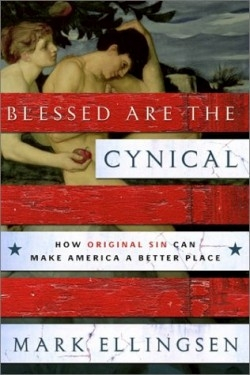Blessed Are the Cynical
How Original Sin Can Make America a Better Place
When social commentators and politicians talk about what’s wrong with contemporary American society, they rarely blame a lack of cynicism. If anything, most would condemn a perceived excess of American cynicism. This author, however, would beg to differ.
An associate professor at Atlanta’s Interdenominational Theological Center, Ellingsen argues that a healthy dose of cynicism could help Americans conduct their public and private lives more successfully, and more happily. He doesn’t advocate the adoption of a hopeless, nihilistic cynicism. Rather, he finds in the writings of St. Augustine and his theological successors (including the framers of the American Constitution) a clear-eyed realism about the sinful motivations behind all human behavior. He believes that this philosophy can free people from the unrealistic expectations that lead to disillusionment, while reminding them to fulfill their moral obligations to one another.
Ellingsen claims that, in the public mind, Augustinian cynicism has been sometimes challenged, and recently supplanted, by what he calls an “Enlightenment-inspired view of human nature”-the view that human beings are basically good, and can be trusted to act in the best interests of others. Ellingsen contends that this view, combined with a “narcissist ethos” that prompts Americans “to express their feelings, to find contentment through expression of those feelings, and not to let anything-even values and binding commitments-get in the way,” have caused Americans to expect personal fulfillment from relationships, work, and public life. When that fulfillment proves elusive, a widespread sense of isolation results: “Narcissists are left with an inner void in their lives, since ultimately all that populates one’s world is the self and its needs.”
Unfortunately, Ellingsen’s argument is not focused enough on providing evidence to convince the reader that the main problem in American society is a lack of understanding of human sinfulness. Instead of providing this evidence, the author frequently launches into tangential diatribes that, since they lack corroboration, only undermine his argument.
While Ellingsen may not persuade the believer in human goodness to become a cynic, he does provide a valuable reminder about the redemptive love of God to the Christian who already believes in original sin. For, Ellingsen reminds us, just as God loves human beings despite our sinful motivations, we are obliged to love one another, and marvel that good providentially results from our self-seeking.
Reviewed by
Melanie Seibert
Disclosure: This article is not an endorsement, but a review. The publisher of this book provided free copies of the book to have their book reviewed by a professional reviewer. No fee was paid by the publisher for this review. Foreword Reviews only recommends books that we love. Foreword Magazine, Inc. is disclosing this in accordance with the Federal Trade Commission’s 16 CFR, Part 255.


